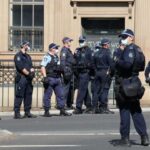Victoria Police Settles Brutality Case for $11.75 Million

Victoria Police has agreed to settle a case of brutality for $11.75 million – an amount which will be paid from public funds.
In 2017, Chris Karadaglis was at home, alone, listening to music when police knocked on his front door in response to a noise complaint from neighbours. Minutes later, Chris was paralysed from the neck down.
What happened is still a blur for the then 47-year old, although he recalls the feeling of being wrapped in a headlock and dragged along his lawn. He also remembers hearing a loud click before feeling limp and struggling to breathe.
The next day, as he lay critically injured in a hospital bed, Chris’ family learned the full extent of his injuries. They were told he would never have the use of his limbs again.
While in hospital, Chris admitted to police he had been drinking on the night.
He said he had initially complied with the police direction to turn his music down, but also admitted that he foolishly turned it back up as police were returning to their car.
But this certainly did not justify the force used on him thereafter.
Initial complaint falls on deaf ears
In the days after the assault, Chris’ sister tried to make a complaint to police, but was told by a senior officer at the local police station that the officers involved had done nothing wrong, and that their stories were consistent.
When police refused to engage with the family further, they lodged a complaint with the Professional Standards Command, (PSC) and subsequently IBAC launched its own investigation in 2019. The findings of that investigation are not publicly available.
Civil proceedings
Through his lawyers, Chris then launched a civil claim in the Victorian Supreme Court.
A settlement has now been reached with Victoria Police, who have agreed to pay $11.75 million of public funds as well as legal costs, less any repayment to the National Disability Insurance Agency.
The long road to justice
Victoria Police have issued a statement to the effect that a settlement had been reached, but refused to make any further comment.
And while it would appear that justice has been served, it has taken Mr Karadaglis four years to have the actions of police acknowledged and for his own suffering to be somewhat compensated. Not only is he now a quadrapledic, he suffers post-traumatic stress disorder as well as depressive and anxiety disorders.
In one interaction with Police, his life was changed irrevocably, And that just should not be allowed to happen.
Lack of accountability
Much has been said, and written about, about the shortcomings of the current police complaints system which allows police officers to ‘investigate themselves’ before very serious incidents are escalated to the oversight body, which in Victoria is the Independent Broad-based Anti-Corruption Commission (IBAC).
IBAC too has faced its fair share of criticism. As it stands both the PSC and IBAC (much like its NSW equivalent ICAC) are poorly resourced and under-funded.
But there’s something much more important that needs to be addressed here — the issue of police accountability. The Court documents in the Karadaglis case did not reference fault nor liability on behalf of the officers themselves.
Victoria police have not named these officers, or referenced whether any or all have been disciplined in any way, suspended or dismissed. It has provided no further information, leaving so many questions unanswered such as, for example, why the officers felt the need to forcibly remove Mr Karadaglis from his own property, when he was alone at the premises, unarmed, and had only committed a very minor offence.
This lack of transparency around incidents of police brutality and use of excessive force amounts to a cover up, which from the general public’s point of view only seems to serve as the perception that our Police Forces in fact, condone this behaviour by officers.







